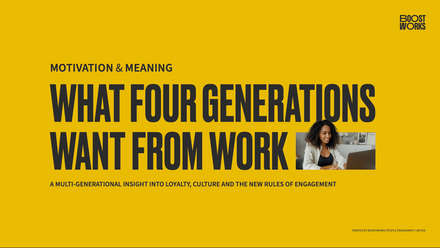Building ethical benefits that work for everyone
While many employers believe their offerings are competitive, a large proportion of employees continue to feel let down by their benefits.
In fact research indicates that while two-thirds of employers believe their staff ‘very much’ appreciate their benefits, only one fifth of employees actually agreed. These figures become even more divisive when analysing age, with 64% of Gen Z employees believing their benefits aren’t as good as those of their older counterparts.
A fundamental reason for this disengagement lies in ethics. Modern workforces are increasingly diverse and values-driven. With rising awareness of mental health and sustainability, employees now expect employers who uphold their personal values. And organisations who don’t listen could lose out on the best talent.
To attract and retain staff, employers need to rethink benefits to ensure they are inclusive, environmentally friendly and reflect the needs of today’s workforce.
Here are four areas where employers can make a difference:
1. Flexible working
Covid-19 entirely shifted workplace dynamics, forcing numerous in-office workforces into hybrid or remote models. While social distancing isn’t needed anymore, it is clear that flexibility is here to stay.
While flexible working was once used to primarily support working parents and caregivers, since the pandemic autonomy has become the norm and is now an expectation from all generations of the workforce.
In fact, numerous studies have demonstrated the ethical influences of flexible working - better work/life balance has positive impacts on stress, burnout, productivity and even job satisfaction. To achieve these outcomes flexibility can be embedded through numerous methods. This includes:
- Hybrid models that combine in-office collaboration and remote-working days to offer greater work/life balance
- Four-day weeks with longer hours
- Flexible start and finish times
- Job-sharing opportunities for those requiring reduced hours
Flexibility isn’t just a matter of logistics, it demonstrates trust, respect and adaptability to employees. In turn, this enhances their engagement, loyalty and productivity, helping organisations retain their best talent whilst boosting business efficiency.
2. Embedding sustainability into benefits
Employees today want to see their personal values through their company’s actions. For many, especially Gen Z and Millenials, sustainability is a critical concern. This has led to greater expectations of environmental commitment from employers.
Studies indicate that more than three quarters of the British workforce want to see improved environmental credentials from employers, while 42% of 18-24-year-olds would be prepared to leave their role if dissatisfied with organisational sustainability.
There’s no one way to improve your organisation’s sustainability initiatives. Effective and often simple ways to show you care include:
- Salary sacrifice schemes for electric vehicles, as well as EV charging infrastructure
- Cycle-to-work initiatives
- Green pension funds with ESG investment options
- Paid volunteering days for environmental or community causes
- Carbon offsetting for unavoidable business travel
- Discounts with eco-friendly retailers and services
By helping employees align their personal choices with professional life, you demonstrate that you care and share their ethics. In turn, they are more likely to care about you and their work too.
3. Supporting health and wellbeing
While wellbeing used to be tailored to the physical, our understanding of health has vastly changed in recent years. It is now understood to be holistic, also covering mental, social and financial health too.
A combination of benefits are needed to promote the health of your employees and ensure they have the ability to care for themselves, and as a result also care for their work. Examples of holistic and inclusive benefits include:
- Mental health support, like counselling and wellness apps
- Comprehensive health insurance with preventive care coverage
- Subsidised gym memberships
- Menopause and reproductive health support
- Access to nutritionists, sleep coaches, or stress management programmes
- Employee assistance programmes for day-to-day challenges
- Financial wellbeing tools and debt management support
Research demonstrates the positive outcomes of wellbeing benefits. For example, mental health support alone has been found to retain 11% more staff while helping drive high productivity rates. By making ongoing care the norm and providing wellbeing resources that work for all diversities, you create a healthier, happier and more resilient workforce.
4. Learning and development that sparks confidence
Employees are facing continuous shifts in how they navigate work - changing workplace models, globalisation and artificial intelligence to name a few. Future-fit upskilling should be critical to not just your benefits and learning strategy, but also your overarching business one.
Helping employees achieve greater confidence in navigating changes not only evokes loyalty and trust from them, but also ensures they excel in their role, optimising business efficiency.
To future-proof your workforce businesses need to include L&D within their benefits. This could include:
- Annual learning budgets for courses, certifications, or conferences
- AI-powered personalised learning platforms
- Mentoring and peer-learning opportunities
- Clear career pathways with transparent promotion criteria
- Cross-functional projects that encourage skills growth
Building a culture of continuous development helps employees grow, positively impacting their mental health and confidence, while helping mitigate against disruptions facing your business.
Final thoughts
Building an ethical benefits package that works for everyone isn’t as scary as it may seem.
Working for everyone doesn’t need to be offering everything to everyone. Employers that listen to their employees and demonstrate a commitment to their personal needs and values evoke higher levels of engagement and loyalty. Ethics isn’t a bonus anymore; it’s the key to retention, engagement and organisational success.
Supplied by REBA Associate Member, Tusker
Tusker is the UK’s leader in salary sacrifice cars. Part of Lloyds Banking Group, it has more than 15 years’ experience in offering an affordable way for employees to drive a new, fully insured, and maintained car. Its scheme, which is available to over 1.8 million UK employees, offers a range of options, from pure electric cars to hybrids and even traditional petrol and diesel vehicles. It provides a tailored scheme for organisations’ individual needs.








